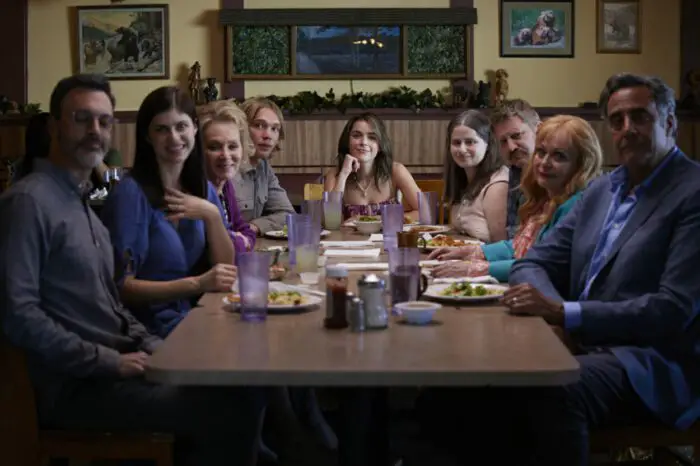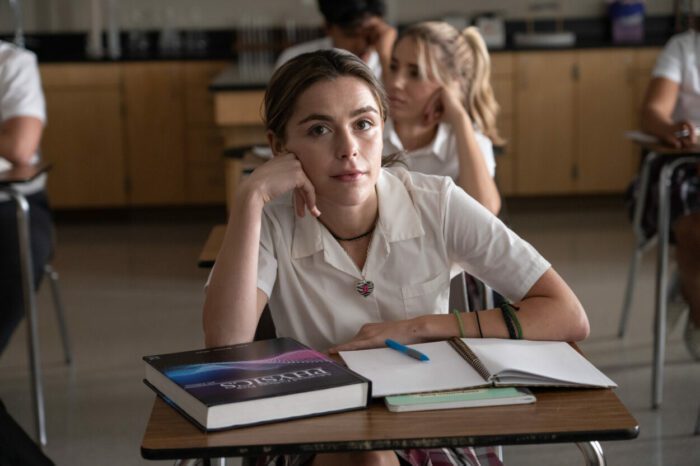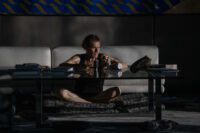Few college entrance essays, I imagine, have in them the seeds of a potential narrative feature film. That hoary old cliché of a rite of passage has been endured with gripes and grimaces by generations, yielding few gems along the way. The story told in the new film Wildflower, directed by Matt Smukler from a script by Jana Savage, might have itself been nothing more than another pedestrian college entrance essay—albeit a pretty fascinating one—had the director not decided to help his niece, an aspiring university applicant, with the process. What was planned as a short personal documentary eventually became a full-fledged semi-biographical feature starring Kiernan Shipka and an exceptional supporting cast, out this week in theaters and on demand.

In spite of its unlikely origins, or perhaps because of them, Wildflower is indeed a pretty good feature film. Its tone may waver and pace may flag here and there, but its sincere heart, apt timing, and resonant story all give Shipka a chance to shine in the kind of fully realized, nuanced role we’ve expected from the former Mad Men child star. It’s maybe a full fourth of the movie before her “Bea” (as she was nicknamed, given her unfortunate birth name: her mother’s favorite character, “Bambi”) gets to do anything but breathe through a tube and narrate the story’s voice-over. Her oddball family has gathered in her hospital room, where Bea lays unconscious.
The extended family includes two sniping grandmothers (played by Jacki Weaver and Jean Smart,) an anxious aunt Joy and her husband Ben (Alexandra Daddario and Reid Scott), and Bea’s two parents, Sharon (Samantha Hyde) and Derek (Dash Mihok), who are, in contrast to the others, comparatively calm, keeping the faith, so to speak, that Bea will wake. But first, unconscious Bea has a story to tell, beginning at the beginning—before that, even—of the events that led to her current predicament.
That story begins with her parents Sharon and Derek’s first meeting each other. What makes Wildflower‘s story “special”—a loaded term, a euphemism with a history—is that Bea’s two parents are neurodivergent. Intellectually disabled, as the press notes read. Or, as other characters described them, often with a degree of condescension, “special.” Their romance and marriage met with concern from their own parents. In raising a child on their own, they faced their challenges head-on. As young Bea (played in these flashback sequences by Ryan Kiera Armstrong) grows up, she becomes more and more of a caretaker for the two. Bea is neurotypical and, as one might expect, finds herself both influenced by and resistant to the influence of friends, society, and media as she grows.
For a time, Bea is sent to live with aunt Joy and Ben, where their helicoptering regimen of lessons and supplements is even more annoying than her own parents’ carefree casualness. It doesn’t last. These early flashbacks all provide necessary exposition, but the narrative doesn’t really take root until Bea—now played by Shipka—reaches senior year. She’s back with her parents, striking up her own first romance with rich boy Ethan (Charlie Plummer), fending off the school mean girls, and saving up for a long-pined-for Disney trip. Bea’s sharp wit and strong will make her a match for any conflict and a memorable teen protagonist.

Here, it feels like the film finally finds its real footing as several conflicts come to a head. Will Bea be willing to leave her parents for college? Can Sharon and Derek manage on their own, without their daughter’s assistance? Will Bea’s budding relationship with Ethan survive? And, as the flashback timeline approaches Bea’s present moment, hospitalized and unconscious, will Bea survive herself?
Wildflower is not the type of film to imply that neurodivergent people should not procreate or parent, and it’s not the type of film that will keep its likable (if flawed) protagonist from her dreams. It’s a feel-good film, but not one without some profoundly dramatic moments along the way, ones that sharply illustrate the challenges of parenting for a neurodivergent family. It’s Bea’s story all the way, and her parents are seen through Bea’s more neurotypical lens.
Samantha Hyde, who plays Bea’s mother Sharon, is a disability activist on the autism spectrum who mentors other disabled artists. Good on Wildflower for getting her casting perfect. (Mihok is on the spectrum with Tourette Syndrome.) Casting a film like Wildflower carries with it a set of potential conflicts, ones not every such film manages adeptly. Last year’s Gigi & Nate, for instance, uses a fully able-bodied actor to portray its protagonist, a young man with a disability. Together, Hyde and Mihok portray Sharon and Derek as a pair of parents who might struggle with jobs and obligations but bring to their parenting plenty of enthusiasm, faith, and above all, love. That Bea comes of age as a confident, capable young woman is due to their parenting, disabilities notwithstanding.

Without its tale of neurodivergence—something more and more filmmakers are willing to address in some unlikely settings—Wildflower might be little more than a run-of-the-mill coming-of-age comedy with a good cast and several clever jokes. But given the story’s origins and its creators’ sincerity, Wildflower works to present a compelling, if comedic, perspective on growing up with neurodivergent parents. It wasn’t easy for Bea, and I’m sure it wasn’t easy for Smukler’s niece and her family. Yet despite their challenges, they managed: Bea is raised in a household with faith and love, and her own courage and determination help her navigate all the awkward, painful moments of adolescent girlhood.
Directed by Matt Smukler in his feature film debut from a script by Jana Savage, Wildflower stars Kiernan Shipka, Dash Mihok, Charlie Plummer, Alexandra Daddario, Brad Garrett, Reid Scott, Erika Alexander, Samantha Hyde, Jacki Weaver, and Jean Smart. Run Time: 105 minutes Rating: R. In theaters and on demand March 17, 2023.




